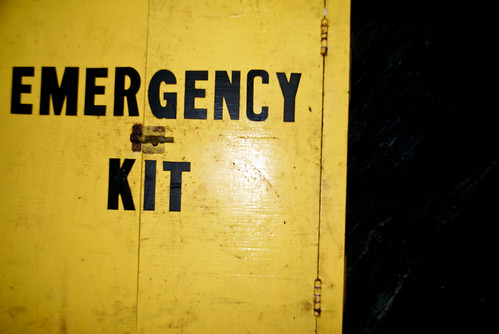15 Items that Should be in Your Medicine Cabinet
15 Items that Should be in Your Medicine Cabinet |  |
| 15 Items that Should be in Your Medicine Cabinet Posted: 23 Aug 2011 04:00 AM PDT When it comes to preparedness, it helps to have a well-stocked medicine cabinet. You want to be ready for unexpected ailments, since there are few things as frustrating as making a run to the store in the middle of the night, trying to find a fever reducer for a sick child. In order to make sure that you are adequately prepared for the minor health issues that are likely to come up. Here are 15 items to keep in your medicine cabinet: Minor Cuts and ScrapesYou want to be prepared for minor cuts and scrapes, ready to take care of these problems — especially if you have children. Here are some of the essentials for minor cuts and scrapes:
Irritations, Allergies and RashesThere are a number of products that can help you treat rashes, irritations and allergies. Here are a few things to keep in your medicine cabinet to combat these common issues:
Stomach Problems, Flu and Cold, Headaches and Fever ReducersA number of other ailments can be treated with items found in your medicine cabinet. Some good choices include:
What do you keep in your medicine cabinet? |
| Want Some Good Advice? That Will Cost Ya! Posted: 23 Aug 2011 04:00 AM PDT There was a time at some point when family finances were an unpleasant task at worst; sticking to a monthly budget, saving for a new family car, and once a year doing the family's taxes… that was about as bad as it got. Financial advisors were for corporations, or for the wealthy. Now with the web of money markets, 401ks, IRA's, annuities, profit sharing, Freddie Mac, and Fannie Mae, the family finances of yesteryear can seem like a cakewalk by comparison. Increasingly, people are using the services of a professional financial advisor; out of either lack of time or lack of knowledge, they feel the fee is worth putting your future in the hands of an expert. Even for those without a lot of savings or investments, there are times in life when the services of a financial advisor can be a real lifesaver, or at least, a money saver. If after years of managing your own savings, in the realm of several thousands of dollars, you come into a windfall of money; this is a perfect time to procure their services. If just it takes only a couple of hours to guide you where to best to invest your windfall, it would be money that's well-spent. Another time would be when setting the plans for your retirement. Don't wait until retirement is practically upon you, that money must be out there working for you long before you retire. Of course, the rules change on just about every form of retirement account once you do retire, or reach retirement age. This, too, would be a good time engage in a consultation with an expert. Should you decide that a financial advisor sounds right for you, there are some things to consider. Financial advisers are not regulated by any government agency; instead the industry has developed their own qualifications. There is one for a C.F.P., a certified financial planner, and the other for a chartered financial planner, which is a C.F.P. A chartered financial planner will not only offer investment advice, but also manage your investments. Not all planners offer the same service, most excel at some area of finance, but even outside of their area of expertise, they often consult with experts within their network bringing you the best options available. When interviewing for a financial advisor expert recommend that you seek someone known for experience with situations similar to your own, proper credentials, personal chemistry, (you need to work closely with this individual, make sure you personalities complement each others), and of course cost. Most advisors are paid on commission though some will work on an hourly rate. The hourly rate is usually available to smaller accounts, or one-time sessions. Do check to see if your advisor is receiving a commission, not only from you, but also from the markets in which he places your investments. Many feel this can lead to a conflict of interest. If you could indeed profit from the expertise of a financial advisor or planner, rest largely on the amount of money you have to manage. Any profits made on smaller investments could well be eaten up by the cost of paying someone to manage it. Michael German is an expert in the field of personal finance and a graduate of Columbia University. His lengthy tenure includes literary work with The New York Times international weekly edition, where he contribute reports on global economy and consumer trends. As a writer and researcher in personal finance, Michael is also a contributor to themanhattandaily.com, freemoneywisdom, and many other online and print publications. |
| You are subscribed to email updates from Financial Highway To stop receiving these emails, you may unsubscribe now. | Email delivery powered by Google |
| Google Inc., 20 West Kinzie, Chicago IL USA 60610 | |




0 Comments:
Post a Comment
Subscribe to Post Comments [Atom]
<< Home